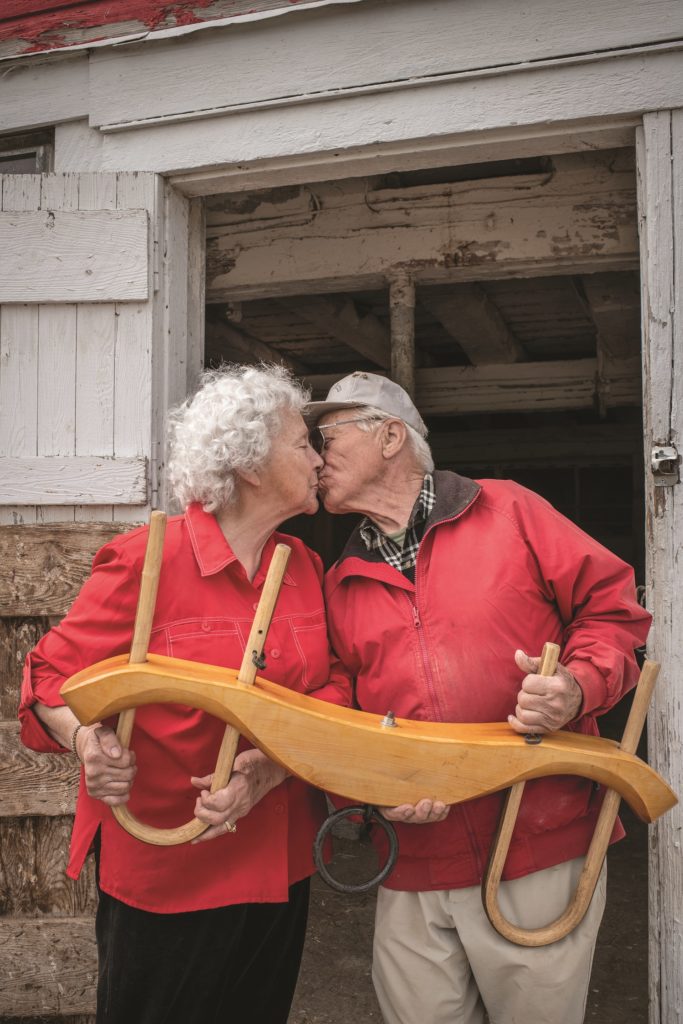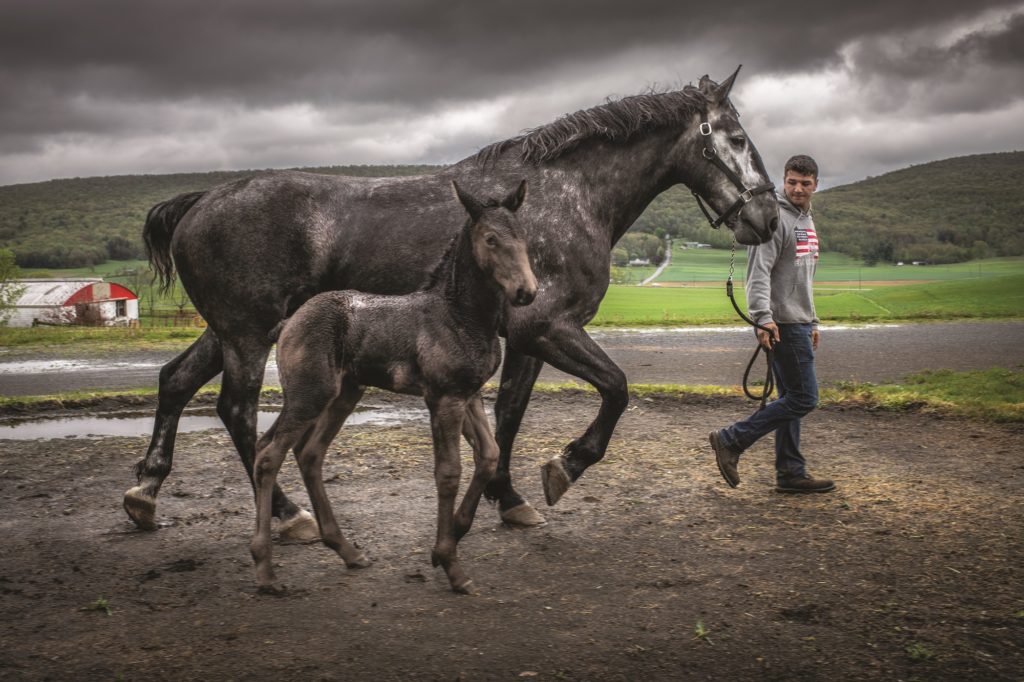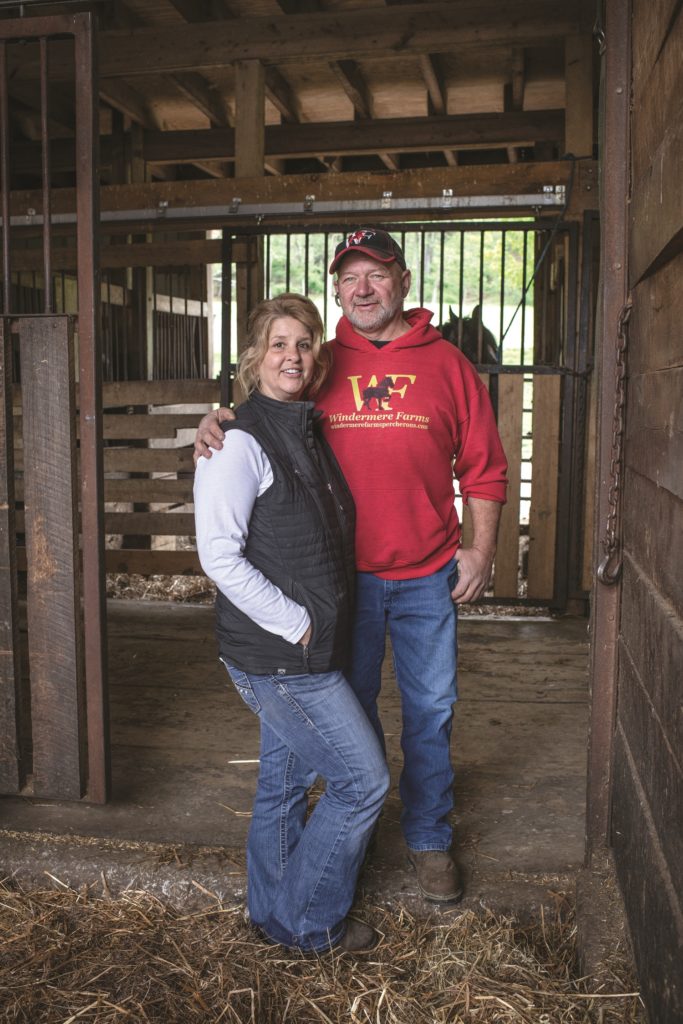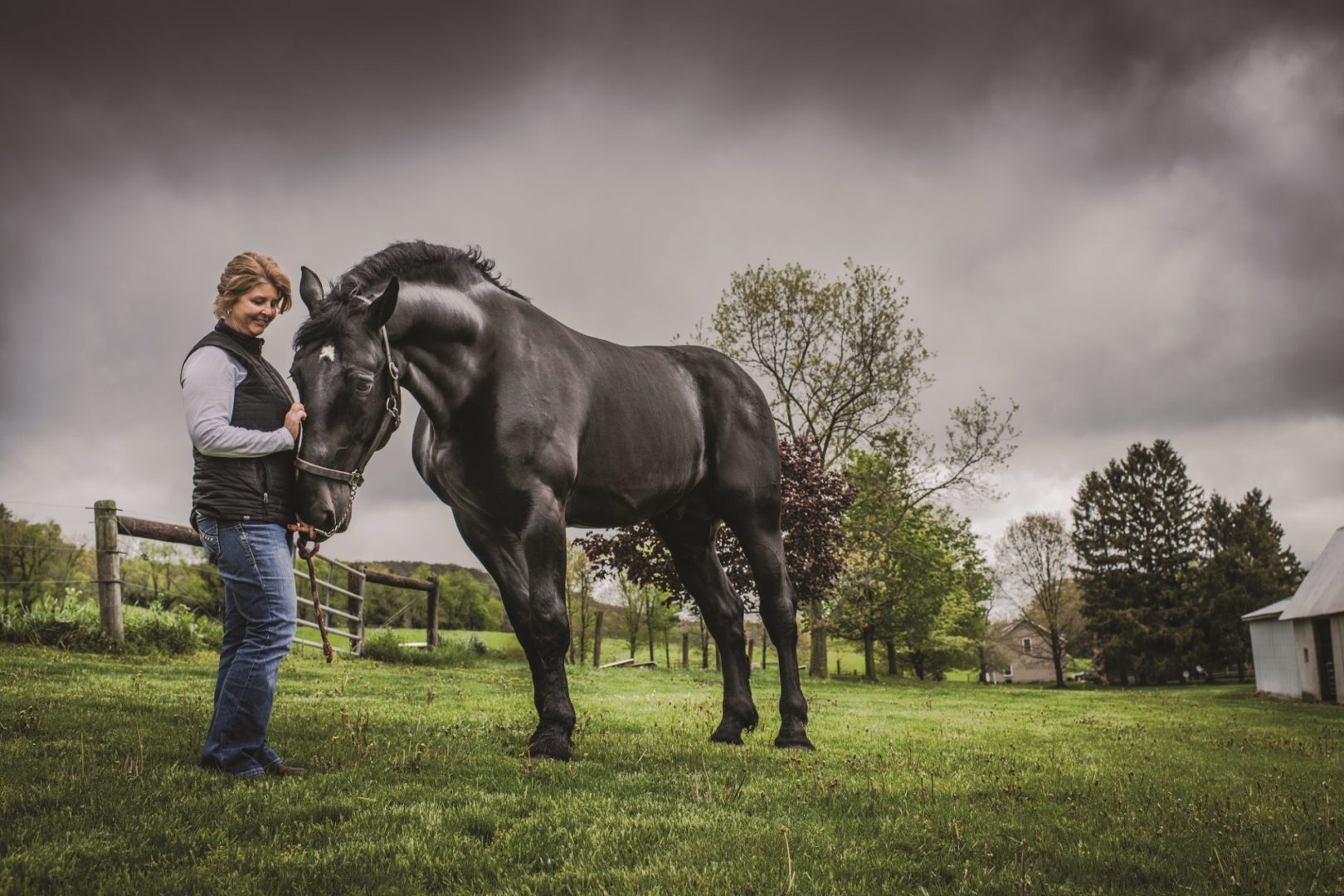The view from Windermere Farms in Spring Mills stretches far across Brush Valley. The mountains shape the valley, with fields and barns highlighting the fertility of the lowlands.
On the farm, Percheron horses – stallions, mares, and foals alike – graze in pastures. The magnificent animals stand tall and strong; their gigantic hoofs trot easily over the land, their strength evident in their muscular frames.
Further down the valley, Penn’s Cave is a landmark known throughout the region. While most have never heard of Windermere Farms, the work done there echoes far beyond the valley and is recognized by Percheron horse enthusiasts across the globe. After all, the husband and wife team of Gerald and Melissa Allebach, along with family patriarch and matriarch Abraham and Mary Allebach, have helped bring the old breed into the 21st century, producing four world championship horses along the way and a legacy that continues to grow.
Animal whisperer
It was back in 1962 that Abe and Mary Allebach established Windermere Farms on what Abe says is “a little piece of heaven.”
Abe grew up on a farm in southeastern Pennsylvania and raised many things through the years. He has a special connection with animals.
“Each animal, the chickens were there to lay eggs, the cows for milking, which I was fifth generation on the home farm, so I even trained my 4-H calf to ride and pull everything. So, it has been there always,” says Abe.

To this day, at an age – 85 – when most men are happy to let the younger men do the heavy lifting, Abe continues to train oxen to work.
It is amazing to see Abe, who is soft-spoken and small of stature, with these 3,000-pound animals. They listen to his every command. Abe is calm and patient while training, and Mary says some call him “the animal whisperer.”
They both grew up in Montgomery County, but Mary’s father was originally from nearby Madisonburg, and through that connection they learned about the farm. Montogomery County was becoming more and more developed, so when the farm in quiet Brush Valley became available, Abe and Mary decided to make the move to the more rural area for their dairy farm. They had some light horses and eventually added some draft horses that could pull the whole family on wagon and sleigh rides.
“We wanted something that we could have here on the farm that everybody in the family could participate in and enjoy. Abe’s family had Percheron work horses when he was at home, and of course a Percheron is the best one,” says Mary.
Mary is the type of person who has to stay busy. She has converted the milking parlor to fit her soap manufacturing and store operation, Windermere Natural Soaps. She taught herself soap-making, and she grows and dries her own herbs to help manufacture the wide variety of soaps and lotions she sells on the farm. When she is not making soap, she might be knitting or making other handmade products she also sells in her store.
She gets an extra sparkle in her eyes when she talks about Percherons.
Percherons are a French draft horse, typically less tall than Clydesdales, but broader. Weighing 1,800-2,600 pounds and standing 60-76 inches tall, Percherons are known as gentle giants, intelligent and willing to work.
“They have a wonderful temperament, and I love the colors. I love the blacks and I love the greys, the dapple greys are absolutely awesome,” she says. “But their temperament is just fantastic, even stallions; we don’t have an issue with the stallions, they are just friends.”
“All of them are smarter and way more athletic than the other draft breeds. We have trained Belgians for people, Clydesdales for people, but they are not the same,” said their young adult grandson Hammer, who is continuing the family tradition on the farm.
“We used to raise Clydes as well, for a long time, and they are OK, but they are so laid back. They are not up and at them like a Percheron,” says Mary. “Percherons are ready to go.”
Building a name
Mary says she always loved raising the horses and watching them grow. Her grandson feels the same way.
“That is the best part of it, raising babies and training,” says Hammer Allebach. A former high school wrestler, he is strong and polite beyond his 21 years. Raising horses is in his blood. Like his dad, Hammer was raised on the farm. Now, he works directly with his mom and dad, Melissa and Gerald, and is a big part of the business on the farm.
Gerald is proud of his son and amazed at how the family farm has grown.
“It is Dad’s farm, and we get to do it here. All those years growing up, we got our first Percheron mares, two of them for $1,200 for the team, and a bunch of these horses go back to that humble beginning,” says Gerald.

From that humble beginning, the Allebachs began to catch the “show bug,” traveling all over the county and picking up honors along the way, including producing national championship horses.
When Gerald was in high school, the family purchased a stallion and started to collect semen. They were pioneers, becoming the first people to figure out the process to ship draft-horse semen to other farms. Other breeders have begun to do it, “but we are still the leaders in it.”
Even with the national championships and innovations, it was still “a hobby that made a little money,” says Gerald. “We are still evolving, we are still growing.”
As a young man, Gerald took jobs away from the farm, working in automotive sales, learning how to make connections with customers.
“Gene Stocker gave me my PhD in sales,” says Gerald with a laugh. He uses that skill these days in dealing with clients all over the world, who come to the farm to train, breed, and consult with the Allebachs. They have sold horses to people from South Africa, Pakistan, France, and Mexico, to name a few.
Gerald is hard-working, organized, and easy to talk to. He has lots of stories. On any given day, Gerald might receive a call from an Amish man from the valley who needs a favor with a horse, or a farmer in Iowa who is looking to breed his favorite stallion, or a wealthy landowner from across the world looking for a prized trophy horse. Those connections mean something to Gerald.
“It means so much to me that we have built all these different relationships to carry on full circle to being a good steward and taking care of the animals,” says Gerald. He has thousands of contacts in his old flip phone, and he is excellent at interacting with people, but he is quick to credit the farm’s success on making it to the next level to his wife’s impact.
“Before she came to Pennsylvania, we did not have any world champion to our name. We had some national champions, we had some very good horses, things went well; but we needed to get reorganized and readjusted to where we could expand it to where it is, where it is a full-time living,” says Gerald.
Melissa has also helped build a strong social media following for a little farm in central Pennsylvania.
“You can have the greatest horses in the world, but what’s the point if you hide them away? Together, we have had four champions in a row,” Gerald says.
Melissa got involved with horses when she was 19, and she has a way with them with her calm, nurturing nature.
Originally from Michigan, she met Gerald at a horse show. She came to the farm with experience in showing horses and has learned to enjoy the breeding process, watching the animals grow from birth.

“I had to learn a lot when I came here. … The longer I am here, the more you just get excited by the new foal crops coming; when you see them hit the ground, there is so much hope in what the future is,” says Melissa. She excels at working with the horses and teaching people how to handle these animals she loves so much.
“These are big animals, and everyone looks at them like, ‘Oh, they are so gentle, they are so nice.’ But they are like that because of their training and because they learn to trust you and they are listening to what you are asking them to do,” she says. “If you don’t get that basis on them, they can be a handful and they can be dangerous. So it feels good when I get a horse and I get a customer who I can see get that bond and can see that they are going to go enjoy that horse every day for the rest of their life, and I don’t have to worry about the person or that horse getting injured.”
Melissa is so well-respected at showing horses that she has been asked to judge shows, taking her experience to the other side of the ring.
“When judging, my thing is, a horse is magnificent, right? So, it is the most magnificent horse that day. Obviously, you have to start fine-tuning and picking things out when you are judging, but it really is pretty easy. It is like the prettiest horse in the ring,” says Melissa. “Their presence, how they are enjoying their job, the brightness in their eyes and the regalness of how they carry themselves. You know your champion that day when they come in the ring; they know it, too.”
Melissa says she will never forget the day their stallion Prince was named their first world champion, at a 2006 show in Virginia. She was feeling a little anxious driving to the show, but once she started getting the horse ready to perform, she could tell he was ready.
“Honestly seeing that horse perform, just for the love of doing, number one, not anyone making him do it, but honestly he would go to the show ring and he would see the arena and give out a great big nicker, and say, ‘Here, I am,’ and he would puff up with air and grow, and he would perform, just loving it. I was proud of that horse,” says Melissa.
For Gerald, that win culminated decades of work, and was a testament to his faith and his family.
“When it happened, I hit my knees right there and had a prayer right there. … I have dealt with unbelievably successful people over the years, and I tell them all the same. I say, ‘This is an area of your life where all your influence, all your social power and financial success, doesn’t mean a thing. All that matters is your relationship between you, your horses, and God, and you just drop to your knees and be thankful for what you got, because all those other things don’t mean a thing,’” Gerald says. “Those types of things can’t make you successful in this.”
Hammer hopes to keep that success going in the next generation. He remembers traveling all over the place, showing horses as a boy. He was in the ring at 12-years-old during one of the world championships.
“It is nice to keep the tradition going, because we have had so much success. … It is cool to see how far we have come from when we first started and how much further you can go, get some more world champions, and hopefully get to the spot where you totally dominate forever.”
Shaping a breed
Gerald notes that, “When you have these great stallions, obviously they are valuable, so you have to insure them. But what people don’t realize is that you can’t insure their blood, all you can do is insure their dollar value, so their blood you have to insure in breeding the next one. If we are breeding responsibly and do what we are supposed to do, then each generation will outdo the next.”
Gerald has only minimally raised the price for breeding after all the farm’s success through years, because he feels strongly about shaping the breed to be the best it can be.
“I am at 40-years-ago prices … but I sold more semen last year than anyone in the United States; so what I do is I do it on volume and I do it ’cause if I don’t do that, they are going to breed this substandard stallion. So, a whole bunch of this is a labor of love in the sense that maybe I could better my family and myself financially by charging more, but I wouldn’t be doing better by the breed,” he says.
“It used to be Percherons, Belgians, and Clydes were all pretty even,” Gerald says. “Last year, somebody went through the book and came up and told me at the major, biggest horse sale there is, 87 percent of the horses in that sale went back to my genetics. Now, in the last five, six years, Percherons dominate all the shows and blow the Belgians and Clydes out of the water; they can’t even get close to competing with them. I can’t say I have single-handedly done that, by any means, but I had a big effect. I say that without arrogance, but I know that my work and my efforts had a big effect. And, when I say ‘I,’ I am talking me and Melissa and the family. That, to me, there is a lot of satisfaction and pride in that.”
Vincent Corso is a staff writer for Town&Gown and The Centre County Gazette. This story appears in the June 2021 issue of Town&Gown.



